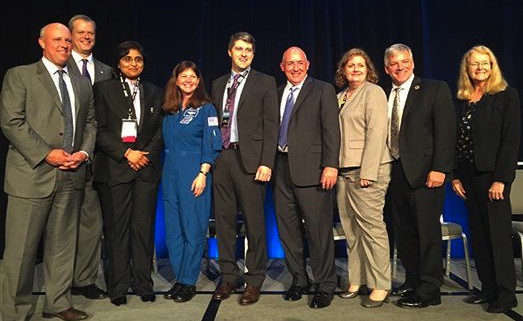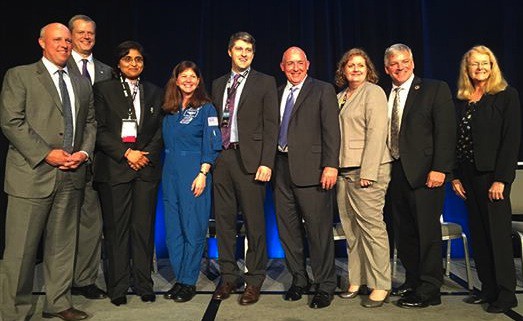
The 1999 Foresight Institute Distinguished Student—Anita Goel, at that time an MD/PhD candidate at the Harvard/MIT Division of Health Sciences and Technology and also a PhD candidate at Harvard’s Physics Department—went on to found Nanobiosym to integrate physics, nanotechnology, and biomedicine. Two years ago Nanobiosym’s Gene-RADAR® sensing technology won the first competition of the Nokia Sensing XCHALLENGE “Nanobiosym Health Radar brings point-of-diagnosis technology directly to consumers“:
Nanobiosym Health RADAR, a Boston-based research incubator institute led by Dr. Anita Goel, was awarded the $525,000 Grand Prize in the first competition of the Nokia Sensing XCHALLENGE for their Gene-RADAR® sensing technology that will transform the way health care is delivered by enabling personalized diagnostic testing.
The Gene-RADAR platform analyzes a drop of blood, saliva or other body fluid placed on a nanochip and inserted into a mobile device, which then detects the presence or absence of a disease’s pathogen in less than an hour, with the same accuracy available only in a diagnostic lab. The technology was developed to be easy-to-use and does not require overhead infrastructure, such as electricity or running water, which can lead to widespread adoption by developing countries.
Nanobiosym has already demonstrated custom applications for E. coli and HIV/AIDS with potential applications across the entire spectrum of health care including diagnosis, monitoring, drug development, companion diagnostics, and personalized nanomedicine. …
This year Dr. Goel and Nanobiosym won the Galactic Grant Competition, securing the opportunity to further develop the Gene-RADAR® technology on the International Space Station (ISS). From azonano “Nanobiosym Chairman and CEO Awarded Top Prize in Galactic Grant Competition“:
Nanobiosym®, a global nanotechnology firm, today announced that its Chairman and CEO, Dr. Anita Goel, M.D., Ph.D, has been awarded the top prize in the Galactic Grant Competition to fund the Nanobiosym Research Institute to push the frontier of nanobiophysics and the Gene-RADAR® technology on the International Space Station (ISS), U.S. National Laboratory.
Uniquely trained as both a physicist and medical doctor at Stanford, Harvard, and MIT, Dr. Goel has, over the past 20 years, pioneered and established through her Nanobiosym Research Institute, a new science at the convergence of Physics, Biomedicine, Nanotechnology and Information Communications Technology. From this science Dr. Goel has developed a commercial product called Gene-RADAR®, a mobile tricorder-like device that enables gold standard real-time diagnosis of any disease with a genetic fingerprint. Gene-RADAR® recently won the prestigious XPRIZE – an international competition that recognizes breakthrough technologies that benefit humanity on an exponential scale.
“I am delighted to accept this award and launch this pivotal partnership between Nanobiosym and the ISS to develop new ‘apps’ for our Gene-RADAR® technology,” said Dr. Goel. “The microgravity environment on the ISS makes biological organisms mutate faster. Gene- RADAR® on the ISS will help us better predict how deadly pathogens here on Earth can mutate to become drug-resistant superbugs, such as MRSA. Our ability to anticipate drug-resistant mutations with Gene-RADAR® will lead to next generation antibiotics that are more precisely tailored to stop the spread of the world’s most dangerous pathogens. We will leverage our research on the ISS to accelerate the Precision Medicine revolution here on Earth.” …
From a press release of The Center for the Advancement of Science in Space “Governor Baker, Massachusetts Life Sciences Center and CASIS Announce Winners of Galactic Grant Competition“:
Massachusetts Governor Charlie Baker, The Center for the Advancement of Science in Space (CASIS) and the Massachusetts Life Sciences Center (MLSC) today announced grant awards for two Massachusetts-based life science companies, totaling $500,000 in grant funding as part of the Galactic Grant Competition. The winners were announced at the 2015 ISS R&D Conference, taking place this year in Boston. The Competition, announced last November, allowed Massachusetts life sciences companies to compete for up to $500,000 in grant funding to support experiments on the International Space Station’s (ISS) U.S. National Laboratory. The winning companies are Nanobiosym, Inc. and Zaiput Flow Technologies, both located in Cambridge. The grant funding will allow Zaiput and Nanobiosym to leverage up to $7.4 million per project of support from CASIS to fly their projects up to station, conduct their projects on station, and bring the experiments back to earth.
Participants in the announcement included Charlie Baker, Governor of the Commonwealth of Massachusetts; Mike Kennealy, Interim CEO of the Massachusetts Life Sciences Center; Mike Suffredini, Head of the International Space Station, NASA; Former NASA Astronaut and Executive Director of CASIS Gregory Johnson; and NASA Astronaut Suni Williams, who was born and raised in Needham, Massachusetts.
“Collaboration is one of our greatest strengths in Massachusetts, and through this first-ever collaboration between CASIS and the MLSC local companies have had the unique opportunity to compete for funds to support innovative life sciences experiments on the International Space Station,” said Governor Charlie Baker. “Congratulations to the winners of this competition, and I look forward to seeing the results of this important research.”
Nanobiosym will seek to validate custom Gene-RADAR® applications to detect the presence or absence of a target pathogen cultivated in zero gravity by analyzing a drop of blood, saliva or other body fluid. The project will attempt to computationally predict bacterial mutations, to evaluate model organisms in space, and to use the empirical results to validate and refine the company’s predictive algorithms. This proof-of-concept experiment will provide data that can be applied to future predictive models for antibiotic resistant pathogen mutations, which will be of significant value to antibiotic drug development. According to the Review on Antimicrobial Resistance, the global burden of infections resistant to existing antimicrobial medicines is now growing at an alarming pace. Drug-resistant infections are already responsible for more than half a million deaths globally each year. Early research commissioned by the Review suggests that if the world fails to act to control resistance, this toll will exceed 10 million each year by 2050 and have cost the world over 100 trillion USD in lost output.
“I am delighted to accept this award and launch this pivotal partnership with the ISS to develop new ‘apps’ for our Gene-RADAR® technology,” said Dr. Anita Goel, Chairman and CEO of Nanobiosym. “We will leverage the microgravity environment on the ISS to accelerate the Precision Medicine revolution here on Earth. Our ability to anticipate drug-resistant mutations with Gene-RADAR® will lead to next generation antibiotics that are more precisely tailored to stop the spread of the world’s most dangerous pathogens.” …
Nanobiosym’s successes provide evidence of the importance of nanotechnology to produce near-term revolutionary innovations in healthcare. We can expect a continuing major role for nanotechnology from the present through the future role of productive nanosystems in the development of advanced nanomedicine over the coming decades.
—James Lewis, PhD

